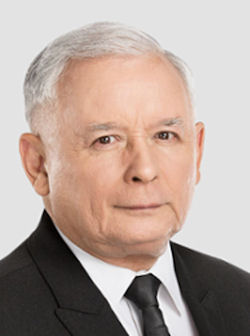Jaroslaw Kaczynski
 Jaroslaw Kaczynski was born on June 18, 1949, in Zoliborz, Warsaw, in a family with patriotic traditions. During World War II, his father Rajmund was active in the underground and served in the Polish Home Army. In 1944, he took part in the Warsaw Uprising, for which he was awarded the Order of Virtuti Militari. His mother, Jadwiga, joined Gray Ranks (in 1941 and participated as a nurse in Operation Tempest.
Jaroslaw Kaczynski was born on June 18, 1949, in Zoliborz, Warsaw, in a family with patriotic traditions. During World War II, his father Rajmund was active in the underground and served in the Polish Home Army. In 1944, he took part in the Warsaw Uprising, for which he was awarded the Order of Virtuti Militari. His mother, Jadwiga, joined Gray Ranks (in 1941 and participated as a nurse in Operation Tempest.
In 1967, Jaroslaw Kaczynski passed his final examinations at the Nicolaus Copernicus Secondary School in Warsaw. He studied law at the University of Warsaw from 1967 to 1971. Kaczynski took part in the events of March 1968.
In 1976, Jaroslaw Kaczynski defended his PhD dissertation entitled “The role of collegial bodies in governing higher education institutions” under the supervision of professor Stanislaw Ehrlich. He was a member of the academic staff in the Institute of Scientific Policy and Higher Education from 1971 to 1976. He worked as an assistant professor at the University of Warsaw branch in Bialystok from 1977 to 1981 and in the Social Research Centre of the Mazowsze Region of the Independent Self-Governing Trade Union “Solidarity”.
After the events of June 1976, he became involved in opposition activities. He cooperated with the Workers' Defence Committee, where he worked in the Intervention Bureau of the Workers' Defence Committee, in the editorial office of the "Glos" independent journal.
Jaroslaw Kaczynski also participated in the events of August 1980. He organised the Solidarity movement in Warsaw and Bialystok, and he was an advisor to the Mazovia Region. After December 13, he continued underground trade union activities; in 1986, he was a co-editor of the "Glos" journal, and he cooperated with the Inter-enterprise Workers' Committee of "Solidarity". He became a member of the Helsinki Committee in autumn 1982.
In 1983, Kaczynski cooperated with the Interim Coordinating Commission. He became the manager of the Social Office of the Interim Coordinating Commission in 1986 and the secretary of the National Executive Committee in 1988.
In 1988, he joined the Citizens' Committee, and he took part in the Round Table Talks.
On June 4, 1989, Jaroslaw Kaczynski became a senator of the Republic of Poland for the Elblag Voivodeship. In the summer, Lech Walesa appointed him and Lech Kaczynski to hold talks concerning establishing the government with a Solidarity prime minister. In consequence, the Tadeusz Mazowiecki's government was formed. In October 1989, he became the editor-in-chief of the "Tygodnik Solidarnosc" weekly magazine. In 1990, he established the "Porozumienie Centrum" political party and became its Chairperson. He led the party until 1998. In 1999, he became its Honorary Chairperson.
In 2001, Jaroslaw and Lech Kaczynski established a new political party – Law and Justice. In 2002, when Lech Kaczynski was elected as the Mayor of Warsaw, he became its Chairperson. From 1991 to 1993, and since 1997 he has been a deputy to the Sejm. He was the Prime Minister from 2006 to 2007.
From 2020 to 2022, he served as Deputy Prime Minister and the Chairperson of the Committee of the Council of Ministers for National Security and Defence Affairs.
Jarek is an extremely intelligent and confident politician, but he has no experience in governance. He shared with brother Lech a very limited exposure to foreign affairs or even foreign travel in general, which led the twins to either distrust or ignore external events. They are also thin-skinned and tend to overreact to "insults" or criticism of Poland, contributing to the clumsy decision to cancel the July 2006 Weimar Triangle meeting in apparent response to a satirical German press piece about Lech Kaczynski. This diplomatic gaffe exacerbated the already poor image of the Kaczynskis. The Kaczynskis were the decision-makers on foreign policy, with a few close aides who act as trusted messengers but not as policy advisors per se.
Jarek Kaczynski was more assertive and detail-oriented than his brother and can be expected to engage in depth on a wide range of issues. While deeply religious with strong views on domestic issues, Jarek Kaczynski appeared to have few foreign policy preconceptions, other than his visceral distrust of Germany and Russia and instinctive affinity for the U.S. Like other successful nationalist leaders, he viewed foreign policy through a domestic political prism. Kaczynski is, however, a quick learner who is already recognizing that a poor image abroad can be just as damaging to his personal prestige as a domestic political gaffe.
|
NEWSLETTER
|
| Join the GlobalSecurity.org mailing list |
|
|
|

